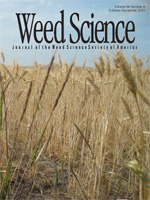Field pea seed from bin cleaning operations stored overwinter on nearby cropland was observed to correlate with weed and crop growth suppression for up to three subsequent years. To explore the phenomenon more explicitly, plant growth suppression trials were undertaken with soil sampled 18 mo apart from two locations that had contained field pea seed residues. Test plant species grown in the residue-affected and nearby residue-free soils were compared in greenhouse experiments. Germination was either fully inhibited or emergence was delayed by more than one week. Dry matter accumulation of test species grown in residue-affected soil was significantly reduced compared to dry matter of these test species grown in residue-free soil (P < 0.0001). Canola and field pea were inhibited more than wheat and green foxtail over both years. Greenhouse trials also revealed that germination of wild oat was inhibited in the residue-affected soils, although wheat and grassy weeds were less suppressed than dicots overall. Significant reductions of weed species diversity and abundance were correlated to residue-affected soils (P < 0.0001) when compared to residue-free soils using multi-response permutations procedures. Germination of wheat and canola seed was inhibited, using aqueous extracts of weathered pea seeds or extracts of the residue-affected soil in bioassays in sterile media. An allelopathic response was proposed to explain the above results, indicating a need for further research on this system. Weed management strategies could be developed with field pea seed residues to provide innovative weed control techniques.
Nomenclature: Green foxtail, Setaria viridis L. Beauv. SETVI; wild oats, Avena fatua L. AVEFA; canola, Brassica napus L; field pea, Pisum sativum L; wheat, Triticum aestivum L.





